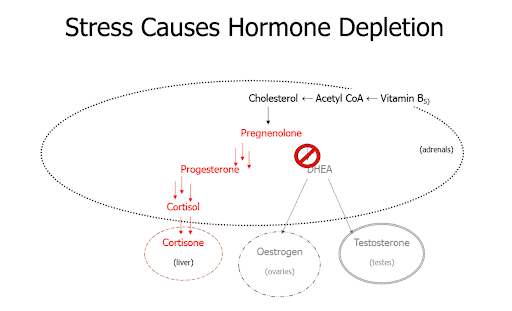
Kàren Maggs
(Midlife and Menopause Coach, Menopause Doula and Certified practitioner My Menopause Transformation)
During peri/menopause, our body is not only undergoing significant change with the loss of oestrogen, but is also suffering from the effects of age and our lifestyle to date.
Although menopause is part of the issue more often than not there are multiple factors affecting our weight gain.
Let’s look at a few of these below.
Metabolic Syndrome and Aging
Metabolic syndrome is a collection of conditions that quite often occur together. They increase our risk of diabetes, stroke and heart disease.[1]
The conditions include:
- Obesity
- High blood pressure
- High blood triglycerides
- Low levels of HDL cholesterol
- Insulin resistance (when your body is not using insulin as effectively as it should, especially in the muscles and liver)
Post-menopausal women have a higher incidence of Metabolic Syndrome than pre-menopausal women, with women who have undergone surgical menopause being the most affected.[2]
A meta-analysis of 23 studies involving 66,801 women found that postmenopausal women had a 3.54-fold higher risk of metabolic syndrome compared to premenopausal women.[3]
In her book, This Changes Everything, Nikki Bezzant interviews Dr Anna Fenton who states:
“When oestrogen drops, there’s a change in insulin and how insulin works. There’s a greater degree of insulin resistance, meaning the body tends to routinely store food as fat for a rainy day, rather than using it to fuel the body.”
As we get older, we also become less efficient at burning the fuel we put in our bodies. Most of us are probably aware that we can’t eat as much as we used to without putting on weight.
As we get older, we are less efficient at burning calories
Another thing to note is that if you’ve had gestational diabetes, this can predispose you to weight gain and thus the development of metabolic syndrome or type 2 diabetes.
Activity Level
Keeping our bodies strong, mobile and flexible becomes more important as we age.
Starting around our 30’s, both men and women begin to lose muscle mass. As we lose muscle mass, fewer calories are burned and fat accumulates.[4]
It’s important to continue to exercise as we move through midlife and menopause. It is recommended that at least 150 min of aerobic activity and 75 min of vigorous activity be undertaken per week for cardiovascular health.[5]
The problem is we just don’t have the energy a lot of the time because of the changes going on in our bodies.
Find something that you can do that works for you right now and then slowly adjust it as your energy returns.
Hormonal Imbalance
By the time women hit peri/menopauses we are not always ovulating (i.e. we may bleed but we may not have released an egg that month).
With no egg release, our body isn’t triggered to produce progesterone which counteracts the oestrogen. Over time, this can result in high levels of oestrogen that can also come crashing down as our body produces erratic progesterone and FSH levels which fail to keep things in balance.
In some women, this can lead to oestrogen dominance. This is where the balance between oestrogen and progesterone gets out of balance.
According to Dr Sandra Cabot, Medical and Executive Director of the Australian Women’s Health Advisory Service “When oestrogen levels are high in relation to progesterone, we experience many severe symptoms.” One of those symptoms can be weight gain.
Any excess oestrogen in our body is stored in fat cells, particularly the abdomen, breasts and thighs. Women who have typically held on to weight over their lifetime, will have more oestrogen receptors in their fat cells.[6]
It’s now also believed that these fat cells can create even more oestrogen themselves, making it even more difficult to lose weight.[7]
Another reason your body can have oestrogen dominance is stress.

When we are stressed, our body produces cortisol, and to do that it uses up the precursor to progesterone, which means less production of progesterone and higher unopposed oestrogen.
Liver Health
Our liver is an important player in controlling our weight as well. As we age, our liver can reduce in size by up to 40% which affects its capacity to continue to operate as it previously has. Any excess oestrogen that it can’t deal with is stored in fat cells.[8]
Our lifelong diet may have caused inflammation, which in turn can cause insulin resistance. That means excess blood sugars go straight into our fat cells, often under the diaphragm and abdominal areas in peri/menopausal women.
Also, as we age, the health of our liver changes and for some women they can develop Non Alcoholic Fatty Liver Disease, or their liver can become inflamed. Although experts don’t yet know exactly why fat builds up in some livers and not others they have indicated that it can be linked to:
- Genetics
- Being overweight or obese
- Insulin resistance, which happens when our cells don’t take up sugar in response to the hormone insulin
- Type 2 diabetes, sometimes called high blood sugar or hyperglycemia
- High levels of fats in the blood (especially triglycerides)
Having said this, it is possible to get NAFLD even if you don’t have any risk factors mentioned above.[9]
Another thing to be aware of is that stress increases cortisol and additional glucose which needs to be removed by the liver. If we are chronically stressed, our liver just can’t keep up, and weight gain results. For some people specifically, studies have found that they may be more responsive to cortisol which leads to weight gain.[10]
RELATED — Understanding Stress: The Silent Killer
One study (S D Hewagalamulage; July 2016) involved 71 healthy women enrolled in a nursing degree, where salivary cortisol was measured twice daily at week 1 and week 12 of the semester.
The study showed that women who exhibited a greater increase in salivary cortisol across the semester had the greatest increase in BMI which indicates that stress-induced elevations in cortisol are associated with weight gain.[11]
Women also show a preference for high fat or sweet foods following a stressful experience.[12]
Gastrointestinal Health and Gut Permeability
Sleep and the Gut
Our circadian rhythm controls our gastro-intestinal tract, digestion and absorption. Healing of our body occurs while we are sleeping, and this includes healing our gut.
If you’re not sleeping, the levels of leptin and ghrelin, which are the hormones responsible for satiety and hunger, get out of balance and can lead to weight gain.
Leptin tells you when you feel full, but it is affected by poor sleep, dehydration, stress and depression. One of the first things to do to help aid in weight loss is to ensure you are getting enough sleep.
RELATED — Introduction to: Depression
Oestrogen and the gut
The lining of the gut can also be affected. One of oestrogen’s roles is to keep our tissues elastic and plump. As oestrogen drops so does the elasticity and plumpness of our tissues.
In other words, oestrogen tightens the microvilli junctions in our gut, and having low levels can lead to having a gap widening between the microvilli which then allows toxins to leak out into our gut. This can then cause Leaky Gut Syndrome and Irritable Bowel Syndrome.
Chemicals and the gut
Another thing to consider are endocrine disrupting chemicals in our environment. These include Xeno-oestrogens and anything containing triclosan.
Xeno means foreign, so a xeno-oestrogen is a foreign oestrogen but its molecular structure is close enough to oestrogen that it can bind to oestrogen receptor sites. Sources of Xenoestrogens include
- Plastics
- Pesticides
- Chemicals[13]
Triclosan is an antimicrobial chemical product used as an antiseptic, disinfectant or preservative. It can be found in personal care products such as
- toothpaste
- mouthwashes
- cosmetics
In Europe 85% of triclosan is used in the personal care products
Studies show that it interferes with our oestrogenic and androgenic receptors and it also has an adverse effect on thyroid and cardiovascular systems.[14]
Having a diet high in whole foods is essential to keep our gut in good working order.
Importance of Sleep
One of the best things you can do to manage your weight as you go through menopause is to ensure you get enough sleep.
RELATED — Great Sleep means Great Health: 17 Health Benefits of Good Sleep
A paper presented to the Endocrine Society’s annual meeting in 2021, stated “Our findings suggest that not only oestrogen withdrawal but also sleep disturbances during menopause may contribute to changes in a woman’s body that could predispose midlife women to weight gain”.[15]
The study showed that with disturbed sleep there was a significant reduction in the rate at which the women’s bodies used fat.
We also need to be aware that our body burns fat when we are in deep sleep and it also heals itself. If we are not sleeping properly our cortisol levels remain high which then prevents the fat burning and muscle repair that occurs overnight.
HRT can help reduce night sweats, allowing better sleep, which in turn helps muscle repair and fat burning overnight.
Related Questions
1. What is the average weight gain during menopause?
Women between 45-55 years old gain around half a kilogram a year on average.[16]
This is typically caused by lifestyle, whereas menopause causes a change in body composition and where you hold your weight.
2. Will estrogen (oestrogen) replacement therapy assist with losing body fat?
There have been indications that Menopause Hormone Therapy may help in reducing visceral fat after menopause but diet and lifestyle have a huge role to play.
The Mediterranean diet is the optimal choice.[17]
3. How can I support my liver health during menopause transition?
To support your liver:
- get good quality sleep
- reduce your intake of alcohol
- reduce sugary foods and ultra processed foods
- eat whole foods
- drink plenty of water.[18]
For more similar articles, see our Women’s Health section.
Kàren supports women who are juggling the multiple challenges of midlife, managing their perimenopause and menopause symptoms, rediscovering themselves, as well as stepping into their Second Spring (their post menopause years), which is full of excitement, passion and purpose…
If you would like to learn more about Kàren, see Expert: Kàren Maggs.
References
(1) Better Health Channel, Victoria State Government. Metabolic-syndrome. February 2014. Retrieved from https://www.betterhealth.vic.gov.au/health/conditionsandtreatments/metabolic-syndrome
(2) Hye Gyeong Jeong, Hyuntae Park. Metabolic Disorders in Menopause. October 2022. Retrieved from https://www.ncbi.nlm.nih.gov/pmc/articles/PMC9606939/
(3) Ying-Ju Ou, Jia-In Lee, Shu-Pin Huang, Szu-Chia Chen, Jiun-Hung Geng, Chia-Hung Su. Association between Menopause, Postmenopausal Hormone Therapy and Metabolic Syndrome. June 2023. Retrieved from https://www.ncbi.nlm.nih.gov/pmc/articles/PMC10342857/
(4) Jamie Bartosch. Why am I gaining weight so fast during menopause? And will hormone therapy help? Retrieved from https://www.uchicagomedicine.org/forefront/womens-health-articles/2023/april/menopause-weight-gain-hormone-therapy
(5) Lily Stojanovska, Vasso Apostolopoulos, Remco Polman, Erika Borkoles. Science Direct, Volume 77, Issue 4, April 2014, Pages 318-323
(6) Alina Kuryłowicz; Biomedicines. Estrogens in Adipose Tissue Physiology and Obesity-Related Dysfunction. 2023 March. Retrieved from https://www.ncbi.nlm.nih.gov/pmc/articles/PMC10045924/
(7) Cleveland Clinic. High Estrogen. September 2022. Retrieved from https://my.clevelandclinic.org/health/diseases/22363-high-estrogen
(8) Hee Kim, Tatiana Kisseleva, and David A. Brenner. Ageing and liver disease. April 2016. Retrieved from https://www.ncbi.nlm.nih.gov/pmc/articles/PMC4736713/#:~:text=The%20volume%20and%20blood%20flow,4%2C9%E2%80%9311%5D.
(9) Mayo Clinic. Non-Alcoholic Fatty Liver Disease. April 2024. Retrieved from
https://www.mayoclinic.org/diseases-conditions/nonalcoholic-fatty-liver-disease/symptoms-causes/syc-20354567
(10) S D Hewagalamulage, T K Lee , I J Clarke, B A Henry. Stress, cortisol, and obesity: a role for cortisol responsiveness in identifying individuals prone to obesity. July 2016.
(11) Cliff Roberts, Nicholas Troop, Frances Connan, Janet Treasure, Iain C Campbell. The effects of stress on body weight: biological and psychological predictors of change in BMI. December 2016.
(12) Grunberg NE, Straub RO. The role of gender and taste class in the effects of stress on eating. Health Psychol 1992;11:97–100.
(13) Tolu Oyelowo DC. Mosby’s Guide to Women’s Health, Chapter 2 – Estrogen Concepts. 2007. Accessible from
https://www.sciencedirect.com/book/9780323046015/mosbys-guide-to-womens-health
(14) Ana C. Marques, Melissa Mariana, and Elisa Cairrao. Triclosan and Its Consequences on the Reproductive, Cardiovascular and Thyroid Levels. October 2022. Retrieved from https://www.ncbi.nlm.nih.gov/pmc/articles/PMC9570035/
(15) Endocrine Org. Sleep disturbances may contribute to weight gain in menopause. March 2021. Retrieved from
https://www.endocrine.org/news-and-advocacy/news-room/featured-science-from-endo-2021/sleep-disturbances-may-contribute-to-weight-gain-in-menopause
(16) Australian Menopause Society. Maintaining your weight and health. February 2019. Retrieved from
https://www.menopause.org.au/health-info/fact-sheets/maintaining-your-weight-and-health
(17) Australian Menopause Society. Maintaining your weight and health. February 2019. Retrieved from https://www.menopause.org.au/health-info/fact-sheets/maintaining-your-weight-and-health
(18) S D Hewagalamulage, T K Lee, I J Clarke, B A Henry. Eat more natural dietary fibre and whole grains to minimise liver disease risk. August 2022.






